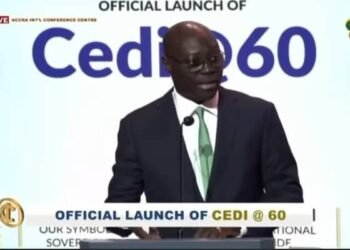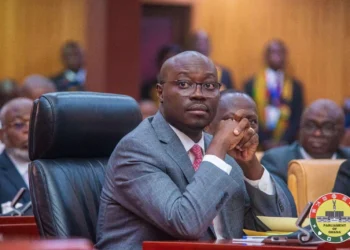The International Monetary Fund (IMF) has thrown its full weight behind the Bank of Ghana’s (BoG) aggressive enforcement of foreign exchange (FX) measures, describing them as essential for safeguarding financial integrity and stabilising the cedi.
Speaking at a press conference in Washington D.C., IMF Director of Communications, Julie Kozack, stressed that the central bank’s directives were not only timely but aligned with global anti-money laundering standards.
“These actions are intended to reinforce the role of the cedi as the sole legal tender in the country,” Mrs. Kozack noted. She emphasised that strict oversight of FX dealings would strengthen transparency in the market, reduce leakages, and curb illicit financial flows.
Over the past months, the BoG has rolled out tougher enforcement of its FX rules, targeting practices that undermine confidence in the domestic currency. These include over-the-counter withdrawals by companies without deposit accounts, the use of foreign currency for pricing and advertising within Ghana, and unlicensed forex trading.
On August 27, 2025, the BoG announced amendments to its guidelines on the importation and exportation of foreign currency. Among the key directives was the reminder that travellers must declare any amount exceeding $10,000 or its equivalent before crossing Ghana’s borders. The Bank stressed that violations of this requirement, as well as black market transactions, directly contravene the Foreign Exchange Act, 2006 (Act 723).
Governor of the Bank of Ghana, Dr. Johnson Asiama, clarified that these measures were not entirely new but part of a renewed push to “close gaps, tighten oversight, and enforce discipline” across the financial system.
Cracking Down on Black Market Transactions
The IMF’s endorsement is a boost to the BoG’s ongoing battle against black market dealings, which have long distorted Ghana’s FX market. Informal transactions often encourage speculative trading, weaken the cedi, and undermine official remittance channels. By outlawing these practices, the BoG hopes to redirect forex flows through legitimate institutions, thereby improving liquidity and stabilising the currency.
Mrs. Kozack reiterated that the IMF viewed these reforms as essential for Ghana’s economic health. “They’re meant to tighten controls on foreign currency transactions and promote formal channels for the provision of remittances and trade,” she explained.
Another critical objective of the BoG’s directive is strengthening compliance with international anti-money laundering (AML) frameworks. Unregulated forex activities often provide cover for money laundering and terrorism financing. By enforcing stricter reporting requirements and shutting down illegal FX operations, Ghana is demonstrating commitment to global financial integrity standards.
The IMF believes that such measures will help shield Ghana from reputational risks and maintain investor confidence, especially as the country deepens ties with international financial markets.
The Bigger Picture: Strengthening the Cedi
The BoG’s renewed enforcement drive comes at a time when the cedi faces persistent pressures from external shocks, rising import bills, and speculative trading. By stamping out illegal forex dealings and ensuring the cedi remains the sole legal tender, the central bank aims to restore market confidence and minimise currency volatility.
For businesses, the reforms could translate into a more stable exchange rate environment, enabling long-term planning and reducing transaction costs. For households, especially those dependent on remittances, the measures may improve reliability and security by ensuring that funds pass through regulated channels.
The IMF’s strong backing of the BoG signals international approval of Ghana’s renewed commitment to financial discipline. Analysts believe this could pave the way for greater cooperation between the IMF and Ghana in areas of fiscal policy, exchange rate management, and financial sector stability.
While the enforcement drive may initially inconvenience businesses and individuals accustomed to informal FX transactions, experts agree that the long-term benefits outweigh the short-term disruptions.
READ ALSO: GIPC CEO Unveils Plans to Anchor Ghana’s Investment Boom























